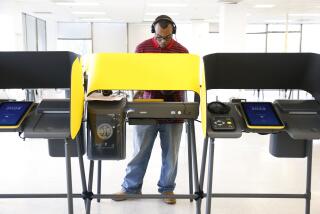Get in line, Florida
Why don’t we just vote for president tomorrow and be done with it? That would be the logical extension of the states’ battle to get to, or at least near, the presidential primary starting line. California and 14 other states that wanted to weigh in early enough to make a difference picked Feb. 5 for their primaries, creating what’s being called Super-Duper Tuesday because it’s a month earlier and includes twice as many states as the Super Tuesdays of old. Now Florida lawmakers, unhappy at having their state’s vote stuck in March, have decided to leapfrog that pack and set their nominating election for Jan. 29.
Not this time. The Democratic National Committee responded with some welcome party rigor: If you jump ahead of the Super-Dupers, the committee told Florida, your delegates will not be seated at the convention. The DNC’s Republican counterpart has now made clear that it too will penalize states that hold early primaries.
Ultimate power over presidential primaries is claimed both by states, which run and pay for the elections, and by the parties, which set many of the rules and which, after all, use the elections to allocate delegates to their conventions. But someone had to put a stop to the one-upmanship that states play against each other in a bid for election-year primacy, and because the states have no incentive to restrain themselves, the parties wisely exercised some discipline.
Sure, easy for Californians to say. The state is already onboard with a presidential primary that was scooted up from June to March and now to early February. Nor did lawmakers here have the purest of motives. Many of them just wanted an excuse to have an extra election next year so they could present voters with a ballot measure to loosen state term limits and, if it passes, still have time to run for their hoped-for extra term in the old-fashioned June state primary.
But California didn’t try to beat the pack. It became part of it, and did so early enough to bring some order and predictability to the process. The Florida move, coming after candidates already have been campaigning in earnest, would do the opposite. The parties’ decision will not stop states from trying to be first in line with their primaries. Broader restructuring is called for; that will require thoughtful and deliberative discussion, and it must apply to future elections. The 2008 race is already well underway.
More to Read
A cure for the common opinion
Get thought-provoking perspectives with our weekly newsletter.
You may occasionally receive promotional content from the Los Angeles Times.






